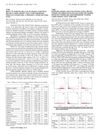 27 citations,
August 2005 in “The journal of investigative dermatology/Journal of investigative dermatology”
27 citations,
August 2005 in “The journal of investigative dermatology/Journal of investigative dermatology” Researchers found new genes involved in hair growth, which could help develop new hair treatments.
 7 citations,
January 2020 in “Scientific Reports”
7 citations,
January 2020 in “Scientific Reports” Rabbit skin analysis showed changes in hair growth and identified miRNAs that may regulate hair follicle development.
 63 citations,
March 2000 in “Annals of clinical psychiatry”
63 citations,
March 2000 in “Annals of clinical psychiatry” Some psychiatric medications can cause hair loss, but it usually grows back after adjusting the medication.
 1 citations,
August 2013 in “Springer eBooks”
1 citations,
August 2013 in “Springer eBooks” Birth control pills and anti-androgen medications help manage hair growth, acne, and hair loss in women with PCOS.
 April 2013 in “The Journal of Urology”
April 2013 in “The Journal of Urology” Higher CRP levels suggest chronic inflammation is linked to bladder-related urinary symptoms in men with enlarged prostates.
 16 citations,
July 1986 in “Dermatology”
16 citations,
July 1986 in “Dermatology” Using minoxidil lotion for hair regrowth in androgenetic alopecia has limited success and should be evaluated carefully.
5 citations,
February 2022 in “Biophysical journal” The model shows that filament flexibility and amino acid differences affect how fast intermediate filament proteins assemble.
 64 citations,
August 2014 in “The journal of allergy and clinical immunology/Journal of allergy and clinical immunology/The journal of allergy and clinical immunology”
64 citations,
August 2014 in “The journal of allergy and clinical immunology/Journal of allergy and clinical immunology/The journal of allergy and clinical immunology” A deficiency in the TTC7A gene causes immune problems, gut issues, and hair loss.
56 citations,
February 2015 in “F1000 prime reports” Root hair growth in plants is a complex process controlled by many factors working together.
 May 2024 in “Brazilian Journal of Hair Health”
May 2024 in “Brazilian Journal of Hair Health” Finasteride and dutasteride may help prevent hair loss but could cause side effects like sexual dysfunction and psychological issues.
 4 citations,
January 2023 in “Journal of Human Hypertension”
4 citations,
January 2023 in “Journal of Human Hypertension” Women experience more side effects and have worse blood pressure control from hypertension treatments than men, despite using different medications.
 24 citations,
July 2019 in “Cochrane library”
24 citations,
July 2019 in “Cochrane library” Some treatments like methotrexate with prednisone might help juvenile morphea, but more research is needed to confirm.
 4 citations,
October 2018 in “Asia-Pacific Journal of Clinical Oncology”
4 citations,
October 2018 in “Asia-Pacific Journal of Clinical Oncology” CDK4/6 inhibitors have improved treatment outcomes for certain advanced breast cancer patients.
 40 citations,
November 2020 in “JAMA Dermatology”
40 citations,
November 2020 in “JAMA Dermatology” Finasteride may cause suicidal thoughts and mental side effects, especially in young people with hair loss.
 44 citations,
September 2019 in “The EMBO Journal”
44 citations,
September 2019 in “The EMBO Journal” Lymphatic vessels are essential for hair follicle growth and skin regeneration.
 10 citations,
August 2012 in “Clinical Pharmacokinectics”
10 citations,
August 2012 in “Clinical Pharmacokinectics” Type 2 diabetes does not change how metformin works in obese pregnant women, so dosage adjustments are not needed.
 47 citations,
September 2022 in “European Heart Journal”
47 citations,
September 2022 in “European Heart Journal” Women may need different blood pressure guidelines than men for heart disease prevention.
 30 citations,
October 2020 in “Nature Communications”
30 citations,
October 2020 in “Nature Communications” Finasteride irreversibly affects human steroid 5α-reductase 2, providing insight into its catalytic mechanism and disease-related mutations.
 6 citations,
March 2020 in “Jornal de Pediatria”
6 citations,
March 2020 in “Jornal de Pediatria” Inflammatory skin conditions are the most common in Brazilian children, with atopic dermatitis being the top issue.
 11 citations,
January 2015 in “Dermatology”
11 citations,
January 2015 in “Dermatology” The conclusion suggests a new way to classify bradykinin-mediated angio-oedema based on different causes and its possible link with urticaria, which could improve diagnosis and treatment.
 September 2014 in “Aktuelle Dermatologie”
September 2014 in “Aktuelle Dermatologie” The symposium concluded that environmental factors significantly contribute to skin aging.
 15 citations,
October 2014 in “Hormone Molecular Biology and Clinical Investigation”
15 citations,
October 2014 in “Hormone Molecular Biology and Clinical Investigation” Some hair loss and prostate drugs might increase the risk of diabetes and heart disease.
 11 citations,
July 2014 in “Gene”
11 citations,
July 2014 in “Gene” The S250C variant in a gene may cause autoimmunity and immunodeficiency by impairing protein function.
 October 2023 in “bioRxiv (Cold Spring Harbor Laboratory)”
October 2023 in “bioRxiv (Cold Spring Harbor Laboratory)” Early regulatory T cells are crucial for normal skin pigmentation.
 13 citations,
October 2010 in “Pharmacogenomics”
13 citations,
October 2010 in “Pharmacogenomics” Researchers found that most genes affecting drug responses are not fully covered by commercial SNP chips, suggesting the need for more comprehensive tools to optimize drug selection based on genetics.
 1 citations,
July 2020 in “Dermatology”
1 citations,
July 2020 in “Dermatology” Photobiomodulation helps reduce pain, lessen inflammation, heal wounds, and can be used in skin treatments. It also boosts hair growth in women with hair loss and may help fight microbes and prevent respiratory issues in COVID-19.
 January 2016 in “Journal of SAFOG”
January 2016 in “Journal of SAFOG” Girls with PCOS and menstrual disorders have notably higher androgen hormone levels.
 21 citations,
January 2020 in “General and Comparative Endocrinology”
21 citations,
January 2020 in “General and Comparative Endocrinology” Lack or blocking of SRD5a, a key component in hormone creation, can lead to conditions like pseudohermaphrodism and affect hair growth, bone mass, muscle strength, and reproductive health. More research is needed on its regulation from fertilization to adulthood.
 41 citations,
September 2014 in “Journal of Pharmacy and Pharmacology”
41 citations,
September 2014 in “Journal of Pharmacy and Pharmacology” Melatonin may help treat PCOS symptoms in rats.
 40 citations,
April 1999 in “Drugs”
40 citations,
April 1999 in “Drugs” Finasteride treats enlarged prostate, improves urinary flow, but may cause sexual side effects.




























